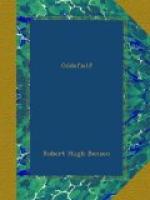I do not know what I said; for all that the Holy Father had told me was what I myself had said to my Lord Abbot. I knew that affairs in England were in a very strange condition, that the Duke of York who was next heir to the throne was a Catholic, and that Charles himself was favourably disposed to us; and I knew a number of other things too which will appear in the course of this tale; and I had said to my Lord that sometimes even a hair’s weight will make a balance tip; and had asked again and again if I might not, with my advantages, such as they were, be of more service to Holy Church in a more worldly place than the cloister; and now here was our Most Holy Lord himself granting and confirming all that I had wished.
“There! there!” he said to me presently, when I had tried to say what was in my heart. “Go and serve God in this way as well as you can; and remember that you can be as well sanctified in the Court of a King as in a cloister—and better, if it is the Court that is your Vocation. Go and do your best, my son; and we shall see what you can make of it.”
* * * * *
When we were outside again I saw that my Lord Abbot’s face was all suffused, as was my own, for there was something strangely fiery and keen and holy about Innocent; but he said nothing, except that we must now go and see His Eminence the Cardinal Secretary of State, for I was to receive my more particular instructions from him.
PART ONE
CHAPTER I
I came to London on the fifteenth of June, having left it seven years before in company with my father, to go to Paris, two years before he died.
It was drawing on to sunset as we rode up through the Southwark fields and, at the top of a little eminence in the ground saw for the first time plainly all the City displayed before us.
We came along the Kent road, having caught sight again and again of such spires as had risen after the Great Fire, and of the smoke that rose from the chimneys; but I may say that I was astonished at the progress the builders had made from what I could remember of seven years before. Then there had still been left great open spaces where there should have been none; now it was a city once more; and even the Cathedral shewed its walls and a few roofs above the houses. The steeples too of Sir Christopher Wren’s new churches pricked everywhere; though I saw later that there was yet much building to be done, both in these and in many of the greater houses. My man James rode with me; (for I had been careful not to form too great intimacies with the party with whom I had ridden from Dover); and I remarked to him upon the matter.
“And there, sir,” he said to me, pointing to it, “is the monument no doubt that they have raised to it.”
And so we found it to be a day or two later—a tall pillar, with an inscription upon it saying that the Fire had been caused by the Papists—a black lie, as every honest man knows.




